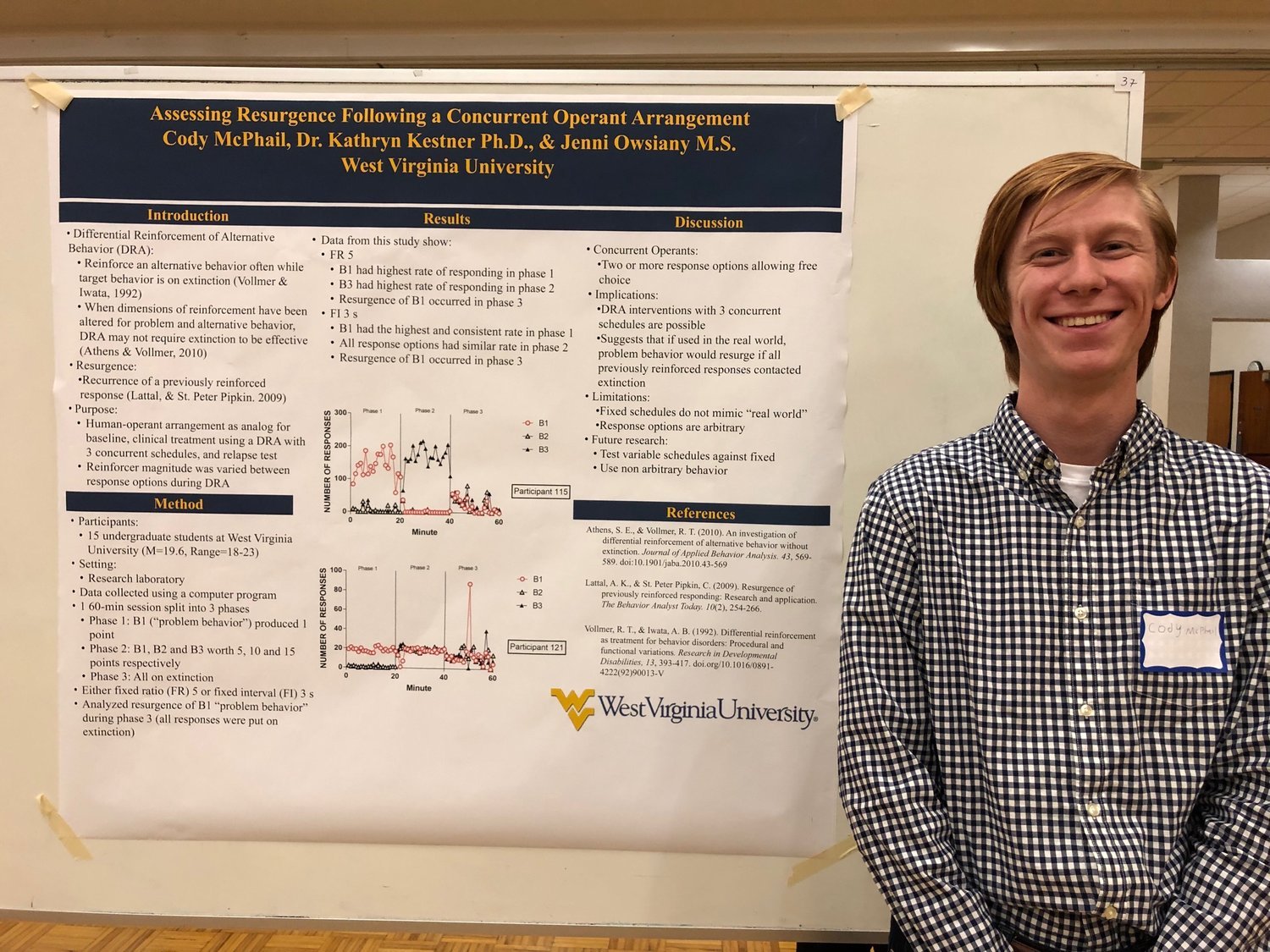NSF REU Site: Translational Research in Behavior Science
West Virginia University
Anticipated Dates: June 1 – August 1, 2026
(9 Weeks)
Rising sophomores, juniors, and seniors are invited to apply for a 9-week paid summer research experience in behavior science.
The REU Site for Research in Behavior Science at West Virginia University is a 9-week summer program for undergraduate student research, funded by the National Science Foundation (NSF).
(Award # NSF 2447228)
REU participants receive high-quality research experience and mentorship to prepare them for pursuing careers in behavior science or related fields. Through this project, we aim to foster interest and participation in experimental psychology and expand the diversity of skilled researchers in behavior science.
PARTICIPANT SUPPORT
Stipend ($700 per week; $6,300 total)
Food stipend and lodging included
Reimbursed travel to/from WVU
WHEN IS THE PROGRAM?
Anticipated Dates: June 1 – August 1, 2026
(9 Weeks)
WHERE IS THE PROGRAM?
The Department of Psychology
West Virginia University, Morgantown, WV, 26505
WHO SHOULD APPLY?*
Rising sophomores, juniors, and seniors as of Summer 2026*
Per NSF: Eligible students are those who are enrolled in an undergraduate degree program (part-time or full-time; baccalaureate or associate degree).
Students who have already received their undergraduate degree prior to the program end date are ineligible.
Qualified Applications Will:
Be majoring in psychology or a closely related field
Have a grade point average 2.8 or above in their psychology undergraduate coursework
*Email Dr. Kestner if you have questions about eligibility.
Note: REU participants must be citizens, nationals, or permanent residents of the United States per NSF guidelines.
Undergraduate psychology majors from primarily undergraduate institutions in the Appalachian region and students from underrepresented groups within psychology, including individuals from underrepresented racial and ethnic groups (e.g., Black, indigenous, and persons of color), veterans, individuals with disabilities, first-generation college students, and students from socio-economically depressed areas are especially encouraged to apply.
Activities
Research Project
Participants will conduct hands-on laboratory research in behavioral science, with an emphasis on translational research in behavioral psychology. Working closely with faculty mentors, doctoral students, and fellow undergraduate researchers, participants will contribute to ongoing projects and gain experience in all aspects of the research process. They will assist in project planning, conduct experimental sessions, collect and analyze data, and interpret findings. Participants will also attend regular lab meetings, where they will engage in scientific discussion and collaborative problem-solving as part of an active research team. Through this immersive experience, participants will develop the skills and professional relationships essential for a future in graduate study and research.
One-On-One Mentorship
Participants will meet one-on-one with their faculty mentor regularly to discuss project progress, prepare a presentation for the WVU Summer Undergraduate Research Symposium, and engage in broader mentorship. These meetings will also support professional development through discussions on graduate school applications, career planning, and skill-building for success in research-focused fields.
Weekly Seminar
Participants attend a weekly seminar. Topics include:
Graduate School Roundtable (with faculty and graduate students)
Career Building (resumes, interviewing, elevator speech)
Prestigious Scholarships
Developing Effective Oral Presentation Skills
Creating and Presenting an Effective Research Poster
Cohort Team Building
Weekend team-building activities such as hiking, indoor rock climbing, a ropes course, and rafting build supportive relationships within the summer cohort
Scientific Writing and Communication Workshop
Participants will build essential skills in scientific communication to prepare for success in graduate school and research careers. Through this workshop series, participants will learn how to communicate their science clearly and persuasively in both written and spoken formats. They will engage with targeted readings on writing, receive didactic instruction from faculty with experience as journal editors, observe skilled presenters, and complete iterative, feedback-driven exercises. By the end of the series, participants will be equipped to craft compelling research narratives, present with confidence, and navigate the communication demands of academic and professional research settings.
Undergraduate Research Symposium
Participants present their research project as a poster or oral presentation at the multidisciplinary WVU Undergraduate Research Symposium.
APPLICATION PROCESS
Application Materials:
Undergraduate transcripts
Personal statement essay
Letter of recommendation
Preferably from an instructor who is familiar with your work in psychology or other scientific topics
The application form includes questions about academic experience and achievements, future career plans, and optional demographic information
Faculty Mentors
-

Karen Anderson, Ph.D.
Research Area:
-

Kathryn Kestner, Ph.D., BCBA-D
Research Area:
-

Claire St. Peter, Ph.D., BCBA-D
-

Kathleen Morrison, Ph.D.
Research Area:
-
Brennan Armshaw, Ph.D.
Research Area:
-

Ray Joslyn, Ph.D.
-

Andy Lattal, Ph.D.
For More Information, Contact:
Kathryn Kestner Ph.D., BCBA-D
kmkestner@mail.wvu.edu
or
Ray Joslyn Ph.D., BCBA-D
Ray.Joslyn@mail.wvu.edu
















